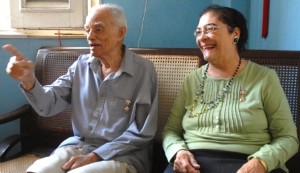 On April 15, 2019, Julio Vitelio Ruiz Hernández, PhD, passed away. He was an outstanding linguist, one of the pioneers of acoustic and experimental phonetics studies in Cuba, the author of novel nationally popular spelling books and the founder of the Center for Applied Linguistics (CLA, Spanish acronym) of Santiago de Cuba. With his death, the physical existence of a scientific dyad that made great contributions to Cuban linguistics and pedagogy came to an end, because, along with his wife, Eloína Miyares Bermúdez, also a linguist, he elaborated part of his vast work.
On April 15, 2019, Julio Vitelio Ruiz Hernández, PhD, passed away. He was an outstanding linguist, one of the pioneers of acoustic and experimental phonetics studies in Cuba, the author of novel nationally popular spelling books and the founder of the Center for Applied Linguistics (CLA, Spanish acronym) of Santiago de Cuba. With his death, the physical existence of a scientific dyad that made great contributions to Cuban linguistics and pedagogy came to an end, because, along with his wife, Eloína Miyares Bermúdez, also a linguist, he elaborated part of his vast work.
Before 1959, as rural teachers in eastern Cuba, Vitelio Ruiz and Eloína Miyares began to show their interest in the correct use of our mother tongue: spelling contests and other initiatives paved the way for much more ambitious efforts.
With the triumph of the Revolution, both youngsters embraced the words of our Commander in Chief Fidel Castro when he said: “The Revolution can indeed gather all the people’s intelligence, energy and spirit of struggle and creation, and put it at the service of well-being and progress!”[1]. And that was exactly what Eloína and Vitelio did: with their enormous energy for struggle and creation, they put their modest intelligence at the service of the well-being and progress of our people in the field of linguistics.
With the foundationin 1971, in Santiago de Cuba, of the Department of Literature and Linguistics of the Academy of Sciences of Cuba (ACC, Spanish acronym), today the Center for Applied Linguistics of the Ministry of Science, Technology and Environment (CITMA, Spanish acronym), both researchers promotedapplied linguistic studies to solve specific problems about language, found in their theoretical research.
In the 70’s and 80’s of the last century, they established phonetics laboratories for the correction of cultural dyslalias in all former Primary Teacher Training Schools and began training in General Linguistics and Phonetics for radio and television announcers in the country. Not surprisingly, in the context of the Fifth National Colloquium on Radio and TV Announcing, held in Santiago de Cuba in May 2015, they were both declared parents of the scientific studies on radio and TV announcing in Cuba.
Together with other prestigious Cuban linguists, such as Max Figueroa Esteva, Gisela Cárdenas Molina, Sergio Valdés Bernal and Gema Valdés Acosta, Eloína Miyares and Vitelio Ruiz contributed to the advancement of this important humanistic science in the development of today’s Cuban society.
During the 90’s and to this day, these guardians of language made one of their old dreams come true: the elaboration of the first school dictionaries in Cuba. The Illustrated School Dictionary and the Basic School Dictionary, together with the VAL-Cuba orthographic methodology, form a triad of results that favor the country's efforts to achieve a better vocabulary and a correct spelling in the students of the National Education System, including those with visual and hearing disabilities.
The dissemination and introduction of results were other characteristics of Vitelio and Eloína. Always in close connection with CITMA and the Ministry of Education, both researchers -together with their tireless CLA collaborators - toured the entire country on several occasions in the so-called National Scientific Linguistics Caravans, an original way of explaining and delivering first-hand to students, teachers and methodologists the varied linguistic-pedagogical results obtained in their institution. In addition, the renowned International Symposiumson Social Communication, with 32 years of existence, contribute greatly to knowing the direction of linguistic studies in Cuba and abroad.
In 2010, the Council of State awarded Vitelio Ruiz and Eloína Miyares - who did not expect it- with the highest decoration given to Cuban workers, the honorary title of Hero of Labor of the Republic of Cuba, for such a long career of dedication, creation and self-sacrifice.
Today, after the physical absence of Vitelio and Eloína, it is our turn to continue - with the same energy and creativity - their extensive and fruitful work, to honor those who will always be, as the prestigious Cuban writer Nancy Morejón called them, goldsmiths of words.
[1]Speech delivered by Commander in Chief Fidel Castro Ruzon the occasion of the International Workers’Day, in the Civic Square, on May 1, 1961 in Fidel, Soldado de las Ideas (Fidel: Soldier of Ideas), http://www.fidelcastro.cu/es/discursos/discurso-pronunciado-resumiendo-los-actos-del-dia-internacionaldel-trabajo-plaza-civica
Estimado Leonel:
Justo y merecido homenaje a los dos. Que sus obras sean la inspiración para muchos más investigadores en esa – nuestra – área del conocimiento.
Un fuerte abrazo,
Eliane Gonçalves
Facultad de Filosofía, Comunicación, Letras y Artes
Departamento de Lingüística
Pontificia Universidad Católica de San Pablo
Brasil
¡Que afortunada fui en conocer personalmente a Don Vite y Eloi!
Puerto Rico, como colonia del imperio, rechazó la oportunidad de abrazar la propuesta que le hicieran para establecer un sistema de alfabetización único, altamente probado para el adelanto educativo y liberación nacional.
Honrarles no es para menos, Leonel, tu gran tarea y deber: continuar la hermosa misión de tus padres para seguir solidificando la cultura y Lucha de ese gran pueblo de pueblos libres de América.
Un abrazo infinito.
Maria